| 23 June |
• yesterday • tomorrow |
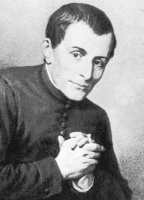
• Giuseppe Cafasso
• Priest of the Gallows
Born with a deformed spine, and into a wealthy peasant family; he was short in stature and crippled throughout his life. Ordained in 1833. Professor of moral theology at the ecclesiastical college at Turin in 1836. Superior of the college from 1846 to 1860. Retreat house director. Pastor of Saint Francis Church in 1848. Renowned confessor. Promoted devotion to the Blessed Sacrament. Friend of and advisor to Saint John Bosco, having first met him when Joseph was 12 years old; Saint John wrote a biography of Saint Joseph. Uncle of Blessed Joseph Allamano. Founded religious fellowships.
Worked to reform prisons and prisoners, and to improve prison conditions in Turin. Ministered to condemned prisoners, winning converts. Once escorted 60 newly converted condemned to the gallows. Since many of the prisoners were hanged immediately after confessing and receiving absolution, Joseph referred to them as "hanged saints".
15 January 1811 at Castelnuovo d'Asti, Italy
• 23 June 1860 at Turin, Italy of pneumonia, a stomach hemorrhage, and complications of his congenital medical problems
• his will bequeathed everything to aid the ministry of Saint Joseph Benedict Cottolengo
• Saint John Bosco preached the funeral Mass homily
22 June 1947 by Pope Pius XII
• captives, imprisoned people, prisoners
• prisons
• prison chaplains
A single word from him - a look, a smile, his very presence - sufficed to dispel melancholy, drive away temptation and produce holy resolution in the soul. - Saint John Bosco, writing about Saint Joseph
We are born to love, we live to love, and we will die to love still more. - Saint Joseph Cafasso
Who is this man who in the world is called an ecclesiastic, a priest? Who is this personage whom some bless and others curse? Who is he whom the whole world talks about and criticizes, and who is the subject of discussion by all pens and all tongues? What is the significance of that name which resounds in every corner of the world? What is a priest? In order to define clearly what he is, I shall avail myself of the distinctions that Saint Bernard made concerning ecclesiastics and shall consider him in his nature, in his person, in his habits. Quid in natura, quis in persona, qualis in moribus! In his nature he is a man like others. In his person, his dignity is above that of all other men in the world. In his conduct and habits, he should be a man totally different from all others as he is by his dignity and office. These are the three points which I propose for your consideration. - Saint Joseph Cafasso
https://catholicsaints.info/saint-joseph-cafasso/
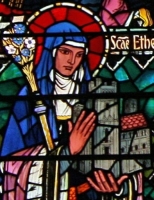
Æthelthryth, Athelthryth, Audrey, Edeltrude, Edilthride, Ediltrudis, Ethelreda, Etheldreda
Sister of Saint Jurmin. Relative of King Anna of East Anglia, England. Princess. Widowed after three years marriage; rumor had it that the marriage was never consumated as Etheldrda had taken a vow of perpetual virginity. She married again for political reasons. Her new husband knew of her vow, but grew tired of living as brother and sister, and began to make advances on her; she refused him. He tried to bribe the local bishop, Saint Wilfrid of York, to release her from her vow; Wilfrid refused, and instead helped Audrey escape to a promontory called Colbert's Head. A high tide then came in - and stayed high for seven days; it kept her separated from her husband and was considered divine intervention. The young man gave up; the marriage was annulled, and Audrey took the veil. She spent a year with her neice, Saint Ebbe the Elder. Founded the great abbey of Ely, where she lived an austere life.
Etheldreda died of an enormous and unsightly tumor on her neck. She gratefully accepted this as Divine retribution for all the necklaces she had worn in her early years.
In the Middle Ages, a festival called Saint Audrey's Fair, was held at Ely on her feast day. The exceptional shodiness of the merchandise, especially the neckerchiefs, contributed to the English language the word tawdry, a corruption of Saint Audrey.
c.636
• 23 June 679 of natural causes
• body re-interred in 694; found incorrupt
• body re-interred in the Cathedral at Ely in 1106; found incorrupt
• neck ailments
• throat ailments
• widows
• University of Cambridge
• abbess holding a model of Ely Cathedral
• abbess with a crown holding a staff which is budding
https://catholicsaints.info/saint-etheldreda/
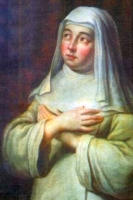
Marie d'Oignies
Born wealthy. From her early youth Mary felt called to the religious life, but she entered into an arranged marriage at age 14. She convinced her husband to live chastely, and to turn their home into a leper hospice. Mary gave away as much of her fortune to the poor as she could, and spent her days caring for lepers. She had a great devotion to Saint John the Evangelist, and a high regard for her contemporary, Christina the Astonishing. Later in life, she moved into a hermit's cell near the Augustinian house at Oignies, France and spent the rest of her life there, praying for souls in Purgatory, and giving advice to would-be spiritual students. Noted for visions, especially of Saint John and her guardian angel, ecstacies, prophecies, and psychic gifts; she ate no meat, dressed exclusively in white, may have been a stigmatist, and reported cut off pieces of her flesh to rid herself of desire for the world.
1167 at Nivelles, diocese of Liege, Belgium
• 23 June 1213 of natural causes
• buried at Oignies, France
• relics transferred to a silver reliquary in the church of Our Lady in Oignies in 1609
• relics transferred to the church of Saint Nicholas at Nivelle, Belgium in 1817
• against fever
• women in labour
• praying for souls in Purgatory
• protected from rain by the Virgin Mary sheltering her with her mantle
• recluse visited by an angel
• woman in white in a hermit's cell praying
• woman in white in a hermit's cell spinning
• woman in white with an angel by her side
https://catholicsaints.info/blessed-mary-of-oignies/
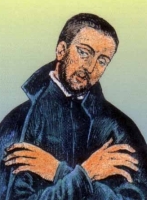
• 25 October as one of the Forty Martyrs of England and Wales
• 1 December as one of the Martyrs of Oxford University
Son of Richard Garnet, an Oxford don. Nephew of Henry Garnet, superior of all Jesuits in England, and in charge of the network of covert priests working among the Catholics who had refused to take the oath of Supremacy. Court page to the Count of Arundel as a boy. Because Catholic colleges had been turned over to aggressive Protestants, young Thomas went to the continent in 1593 to attend the newly opened Jesuit college at Saint Omer in the Low Countries. He studied for four years at the college of Saint Alban at Valladolid, Spain where he was ordained. Joined the Jesuits in 1604, but before he could begin his novitiate he was arrested for priesthood and lodged in the Tower of London. Exiled from England in 1606. He returned soon after to minister to covert Catholics, and worked near Warwickshire for six years, but his ministry ended in arrest during the round-up following to the discovery of the Gunpowder Plot. A plot was hatched to break Thomas out of jail, but he wrote his superior asking that the plotters not try. One of the Forty Martyrs of England and Wales.
1574 at Southwark, England
hanged, drawn, and quartered on 23 June 1608 at Tyburn, London, England
25 October 1970 by Pope Paul VI
https://catholicsaints.info/saint-thomas-garnet/
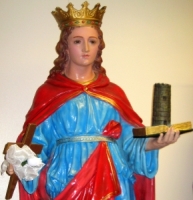
Agrippina of Mineo
Born to the imperial Roman nobility. Consecrated virgin, the closest thing at that time to a nun. Tortured and martyred during the persecutions of Valerian.
imperial Roman citizen
• beheaded or scourged to death (records vary) c.262 in Rome, Italy
• body taken to Mineo, Sicily by three women
• her tomb became known as a place of cures and miracles which led to her patronage against several things
• some relics now in Constantinople
• against bacterial diseases or infections
• against evil spirits
• lepers; against leprosy
• against storms, safety from storms
• Mineo, Italy
• crowned woman holding a cross and a small tower
• crowned woman holding a cross and a small tower that sits on a book
• crowned woman holding a palm of martyrdom
https://catholicsaints.info/saint-agrippina-of-rome/

Born into a family of Greek-Catholic priests. Studied at Sant’Atanasio and the Pontificium Institutum Internationale Angelicum in Rome, Italy. Ordained a priest in the Romanian Greek-Catholic Rite on 29 November 1931, and earned a doctorate in theology. Chosen auxiliary bishop of Oradea Mare {Gran Varadino}, Romania and Titular Bishop of Moglaena on 25 May 1940. Chosen Apostolic Administrator of Fagaras si Alba Iulia, Romania in 1942. Arrested in 1948 by Communist authorities for his involvement in Christianity, he was imprisoned until his death 5 years later. Martyr.
4 December 1907 in Blaj, Alba, Romania
• 23 June 1953 in Sighetu Marmatiei, Maramures, Romania
• buried in a mass grave in within the prison, his body has never been recovered or identified
2 June 2019 by Pope Francis
https://catholicsaints.info/blessed-ioan-suciu/
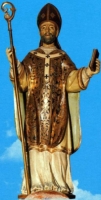
Born to the Italian nobility. Chosen bishop of Pavia, Italy by Pope Alexander III in 1159. Known as a pious and charitable shepherd of his people. Had to fight civil authorities who wanted to seize Church property, and worked to recover property that had already been seized. When the civil authorities exiled him, he was restored to his diocese through the intervention of Pope Clement III. The endless wrangling and politics wore him down, and he eventually retired to spend his final years at the Vallombrosan monastery of the Holy Sepulchre near Pavia.
c.1124 at Gropello, Pavia, Italy
23 June 1198 at the Vallombrosan monastery of the Holy Sepulchre near Pavia, Italy of natural causes
https://catholicsaints.info/blessed-lanfranco-beccari/
A wealthy noble. Soldier in the imperial Roman army. Seeing other Christians being martyred, he was led to become open with his own faith. He freed his slaves, gave away his wealth and possessions, and proclaimed himself a Christian before the governor; he was immediately imprisoned and tortured. Martyred in the persecutions of Diocletian.
3rd century in Philadelphia in Arabia near the Dead Sea (probably refers to Rabbath-Ammon east of Palestine, the modern Amman, Jordan)
beheaded in 304 in Philadelphia in Arabia near the Dead Sea (probably refers to Rabbath-Ammon east of Palestine, the modern Amman, Jordan)
https://catholicsaints.info/saint-zeno-of-philadelphia/
Libert, Liberto, Liebert
Born to the aristocracy. Archdeacon of Cambrai, France. Bishop of Cambrai in 1051. Pilgrim to the Holy Lands in 1054. Noted for the austerity of his life, and his determination in the face of persecution of the Church and the endless political power struggles of the time.
Brabant, Belgium
• 22 June 1071 of natural causes
• buried on 23 June in the Abbey of the Holy Sepulchre
https://catholicsaints.info/saint-lietbert/
Zena
Former slave of Saint Zeno. After being freed, he stayed with Zeno as a servant, and became public about his Christianity. Imprisoned, tortured and martyred in the persecutions of Diocletian.
beheaded in 304 in Philadelphia in Arabia near the Dead Sea (probably refers to Rabbath-Ammon east of Palestine, the modern Amman, Jordan)
https://catholicsaints.info/saint-zenas-of-philadelphia/
Peter of Jully
Benedictine monk. Noted preacher. Friend of Saint Stephen Harding, and worked with him at the monastery in Molesme. Chaplain, rector and confessor to the convent of Juilly les Nonnais, France where he worked with Saint Humbeline. Miracle worker.
England
1136 of natural causes
https://catholicsaints.info/blessed-peter-of-juilly/
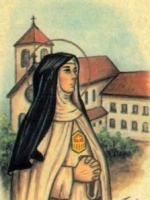
Francesca
Mercedarian sister. Founded the monastery of the Assumption in Seville, Spain. Known for her personal piety and deep prayer life.
buried in the church of the monastery of the Assumption in Seville, Spain
https://catholicsaints.info/blessed-frances-martel/
Born to the Gallic nobility; brother of Saint Liliosa of Toul. Benedictine monk at Hornbach, diocese of Metz, France. Bishop of Toul, France in 756. Great benefactor of the Benedictines.
at Berrigny, Haute Marne (in modern France)
769 of natural causes at the tomb of Saint Benignus in Dijon, France
https://catholicsaints.info/saint-james-of-toul/
• Hidulphus of Lobbes
• Hidulf, Hydulfus
Count of Hainault in modern Belgium. Courtier at the royal palace of Austrasia. Married to Saint Agia. Helped found Lobbes Abbey which, with Agia's blessing, he entered as a Benedictine monk.
c.707
https://catholicsaints.info/saint-hidulphus-of-hainault/
Priest. Martyred during the persecutions of Julian the Apostate.
at Rome, Italy
• beheaded in 362 in Rome, Italy
• a head at the church of San Silvestro in Capite, Rome, identified as Saint John the Baptist, was probably this John instead
https://catholicsaints.info/saint-john-of-rome-23-june/
Member of the Servites. Served his house as a beggar. Visionary.
c.1300 in Orvieto, Italy
1343 in Orvieto, Italy of natural causes
10 December 1768 by Pope Clement XIII (cultus confirmation)
https://catholicsaints.info/blessed-thomas-corsini-of-orvieto/
Bili
Bishop of Vannes, Brittany (in modern France). Murdered by invading Normans. Martyr.
• c.914 in Vannes, Brittany (in modern France)
• buried at the chapel in Plandren, France that he had built
https://catholicsaints.info/saint-bilio-of-vannes/
Franciscan Friars Minor priest. One of the Irish Martyrs.
Irish
23 June 1653 on Scarrrif Island, Kerry, Ireland
27 September 1992 by Pope John Paul II in Rome, Italy
https://catholicsaints.info/blessed-francis-osullivan/
Born to the Gallic nobility, the sister of Saint Jacob of Toul. Gave the country estate of Bretancour to the monks of the Saint-Bénigne to build a church.
8th century Gaul (in modern France)
https://catholicsaints.info/saint-liliosa-of-toul/
Priest in Belgium. Murdered for his righteousness and venerated as a martyr.
• 1199 in Onhaye, Brabant (in modern Belgium)
• relics enshrined in Dinant, Belgium
https://catholicsaints.info/saint-walhere-of-dinant/
Moelray, Melray, Mochaoi
Baptised by Saint Patrick. Monk. Abbot of Nendrum Monastery.
Ireland
c.493 of natural causes
https://catholicsaints.info/saint-moeliai-of-nendrum/
Priest in Sutri, Tuscany, Italy. Martyred in the persecutions of Valerian and Gallienus.
scourged to death in 257
https://catholicsaints.info/saint-felix-of-sutri/
Joined the Mercedarians at age 34, and served for the next 80 (!) years at the convent of Santa Maria in Logrono, Spain.
https://catholicsaints.info/blessed-lupo-de-paredes/
No information has survived.
1113 of natural causes
https://catholicsaints.info/blessed-felix-of-citeaux/
A family of converts who were arrested, tortured, and sent in chains to Ancyra, Galatia (modern Ankara, Turkey) where he was tortured more by order of governor Agrippinus during the persecutions of Diocletian. Martyr. They were - Eustochius, Gaius, Lollia, Probus, Urban
roasted over a fire and finally beheaded c.300 in Ancyra, Galatia (modern Ankara, Turkey)
https://catholicsaints.info/martyrs-of-ancyra/
During the persecutions of Diocletian, many Christians fled their homes to live in caves in the area of Nicomedia. In 303 troops descended on the area, systematically hunted them down, and murdered all they could find.
https://catholicsaints.info/martyrs-of-nicomedia-23-june/
• Madonna del Sasso
• Eldrude of Brittany
• Gerhard of Clairfontaine
• Maria Raffaella Santina Cimatti
• Morónóg of Inishloe
• Peter James of Pesaro
CatholicSaints.Info Portable Edition